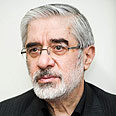
'Vulnerable situation.' Mousavi
Photo: AFP
US diplomatic cables released by WikiLeaks show Iran's hard-line policies have left it without "a single ally" among neighboring countries, an Iranian opposition leader said Sunday in a direct challenge to Tehran's official view that Washington seeks to poison relations in the region.
The claims by Mir Hossein Mousavi touches on the difficult position for Iran's ruling establishment following the memos, which cite some Arab leaders - including Saudi Arabia's powerful King Abdullah - urging for US military action to halt Iran's nuclear program.
Nuclear Program
Associated Press
Despite renewed talks over nuclear program, White House senior official says Washington, European allies drafting new round of sanctions meant to keep up pressure on Islamic Republic to come clean about its nuclear ambitions
Iran claims the cables are a ploy by Washington to damage Iran's image and possibly try to mobilize support for a military strike - positions that authorities have aggressively pressed in the state media while trying to silence other viewpoints.
But US-allied Gulf Arab leaders have made no attempts to backtrack from the statements in the cables. Last week, at a summit in Abu Dhabi, they sharply warned Iran to stay out of their affairs and rejected "force or the threat to use it.
A stronger stance by the Gulf Arab states could pose further economic hardships for Iran because of close trade ties and make it harder for Tehran to claim that only the West is demanding answers about its nuclear program.
Mousavi, in a statement posted on his web site, said the WikiLeaks releases "clearly show our vulnerable situation in the region."
'Preparations for hostile US actions'
He blamed the hard-line stance of his rival, President Mahmoud Ahmadinejad, for pushing Iran into greater international isolation.
"With such policies, we effectively don't have a single ally among our neighbors," said Mousavi, who claimed widespread voting rigging after his loss to Ahmadinejad in last year's disputed elections.
The unrest that followed - the worst domestic upheavals since the 1979 Islamic Revolution - led to a relentless crackdown on dissidents, the media and the Internet.
The US diplomatic messages on Iran dwell heavily on trying to decipher Iran's internal tensions and its nuclear ambitions, which the US and allies worry could eventually lead to atomic weapons. Iran insists it only seeks reactors for energy and research.
At first, Iran dismissed the State Department memos as "mischief" aimed at damaging Tehran's ties with the Arab world and said that reading them would be "waste of time."
But Iran could not stay silent as the depth of the Arab worry made headlines around the world - including Saudi's King Abdullah urging for a US-led attack against Iran to "cut off the head of the snake."
Iran's foreign minister, Manouchehr Mottaki, told a security summit in Bahrain that Iran would never threaten Muslim neighbors. Authorities, meanwhile, have pressured Iranian newspapers to closely follow the state line on the WikiLeaks releases.
Deputy head of Iran's Armed Forces Joint Chiefs of Staff, Masoud Jazayeri, said the leaks are preparations for "hostile US actions" against Iran in the future.
"What's shaping around Wikileaks reports is based on the formula that we will witness hostile US actions in the future against countries that were the target including Iran," the semiofficial Fars news agency quoted Jazayeri as saying earlier this week.
Unlike Ahmadinejad, Jazayeri said at least part of the leaks could be "real news" that are no longer classified US intelligence.
But Foad Izadi, a prominent professor who specializes in US studies, urged the government Saturday to reconsider its hasty reaction to the leaks and stop pressuring the media from publishing or analyzing the documents.
"Our diplomacy apparatus must not act in haste and reject the documents while only one-thousandth of them have been revealed," Fars quoted Izadi as saying.
Izadi, who heads the North America Studies Group at Tehran University, rejected Iranian claims that the US government was behind the leaks, saying Washington suffered more than it could gain from the exposures.
"The biggest blow the documents inflicted was on US image. A country that can't protect its diplomatic secrets will hardly be trusted," Fars quoted him as saying.
- Follow Ynetnews on Facebook















